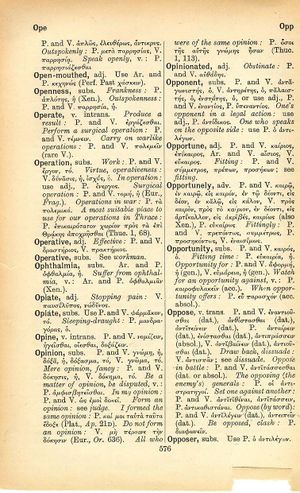opportune: Difference between revisions
Κύριος εἶπεν πρὸς μέ Υἱός μου εἶ σύ, ἐγὼ σήμερον γεγέννηκά σε → the Lord said to me, My son you are; today I have begotten you
m (Text replacement - "link={{" to "link={{") |
m (Text replacement - "}}]]" to "}}]]") |
||
| Line 1: | Line 1: | ||
{{Woodhouse1 | {{Woodhouse1 | ||
|Text=[[File:woodhouse_576.jpg|thumb | |Text=[[File:woodhouse_576.jpg|thumb | ||
|link={{filepath:woodhouse_576.jpg | |link={{filepath:woodhouse_576.jpg}}]]'''adj.''' | ||
P. and V. [[καίριος]], [[ἐπίκαιρος]], Ar. and V. [[αἴσιος]], V. [[εὔκαιρος]]. | P. and V. [[καίριος]], [[ἐπίκαιρος]], Ar. and V. [[αἴσιος]], V. [[εὔκαιρος]]. | ||
<b class="b2">Fitting</b>: P. and V. [[σύμμετρος]], [[πρέπων]], προσήκων; see [[fitting]]. | <b class="b2">Fitting</b>: P. and V. [[σύμμετρος]], [[πρέπων]], προσήκων; see [[fitting]]. | ||
Revision as of 10:11, 15 August 2017
English > Greek (Woodhouse)
adj.
P. and V. καίριος, ἐπίκαιρος, Ar. and V. αἴσιος, V. εὔκαιρος. Fitting: P. and V. σύμμετρος, πρέπων, προσήκων; see fitting.
Latin > English (Lewis & Short)
opportūnē: adv., v. opportunus.
Latin > French (Gaffiot 2016)
opportūnē¹² (ōport- Cic.), à propos, à point, à temps : Ter. Ad. 81 ; Cic. Nat. 1, 16 ; Fin. 5, 8 ; Cæs. G. 4, 22, 2 || -nĭus Gaius Inst. 2, 97 || issime Cæs. C. 3, 101.
Latin > German (Georges)
opportūnē, Adv. (opportunus), bequem, gelegen, zur guten Stunde, vox opp. emissa, Liv.: ut tempore opportuneque attulistis, Plaut.: te exspecto; oppido opp. te obtulisti mi obviam, Ter.: pater, opp. advenis, Ter.: ellipt., ambo opp. (sc. adestis); vos volo, Ter. (s. Spengel Ter. Andr. 345): opp. adest homo summā fide et omni virtute praeditus, L. Plaetorius, Cic.: atque mihi quoque videor venisse, ut dicis, opportune, Cic.: nuntiis opportunissime allatis, Caes.: Anticyra in Phocide ad id opportunissime sita visa (est), Liv.: m. Dat. Gerund., per eos dies opp. irritandis ad bellum animis litterae ab M. Aurelio allatae, Liv. 31, 5, 5 (wo Hertz u. Weißenb. oportune schreiben, wie auch Porphyr. Hor. carm. 1, 10, 14 im cod. Monac. steht; vgl. opportunus a. E. / ).

